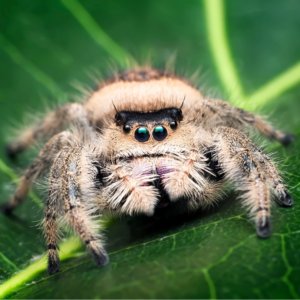The best beginner jumping spiders belong to the genus Phidippus. This genus contains all of the most popular easy-care species, such as the regal jumping spider, bold jumping spider, and widow jumping spider. Other jumping spiders, such as those belonging to the genus Hyllus, are considered ideal for keepers that have a little bit of experience under their belt. Regal jumping spider morphs or localities such as White Bahamas, Soroa, etc, are varieties of jumping spiders hailing from different parts of the Americas that may showcase patterns and colourations unique to that region. They have identical care needs to other members of that species, and are great for inexperienced keepers that want another easy-care spider. There are so many jumping spider morphs, locales, and colour variants to choose from, with brand new options regularly in stock.
Jumping spiders are carnivorous arachnids that typically eat insects and other arachnids. Check out our jumping spider food bundle for a great range of popular live food. Spiders kept in captivity are typically fed D.Hydeii fruit flies as young spiderlings, later maturing onto waxworms / wax moths, mealworms, blue/green bottle flies, and almost any other insects they will gladly take.
Jumping spiders are all different, often with distinct personalities. Some will be bolder, willing to take large, active prey. Others may be shy, preferring docile prey items significantly smaller than themselves. We recommend trying out many different live food sizes and types, to see what your spider prefers. The healthiest jumping spider feeder insects include flies, crickets, locusts, and other fully developed bugs. Grubs, such as waxworms and mealworms have a high fat content with lower protein, and are best used as weekly treats.
Yes, it’s safe to buy jumping spiders from us. We ship exclusively within the UK via ‘Royal Mail Next-Day Before 1pm Guaranteed’ service, ensuring your pet spiders spend only minimal time in transit. We’ll send out a shipping confirmation email when they’re on the way. If there are any issues and your animals arrive ill or deceased, we offer refunds for injuries and illnesses within a 7 day window after arrival.*
The wait is over! It’s time to unbox your new pet spiderling from its temporary transit container and get it into its home. Ensure you’ve prepared your pet’s setup ahead of time – you’ll want to get it settled in as soon as possible. Unbox your pet in an open space, ensuring it can’t dart away anywhere. Then, use a soft brush to coax the animal into its new setup.
As jumping spiderlings are very small, You’ll want to first purchase a rearing enclosure from our selection to grow your spiderling for just a few months before rehousing it into its adult terrarium.
After your spider has settled in to its new home, you can add in a little live food like fruit flies, gently mist the enclosure’s walls, and leave your spider to de-stress and eat.
Yes, depending on the species, pet jumping spiders are considered easy pets to care for. Jumping spiders need only a small habitat to thrive – too big and they may miss their food. They’ll need a light daily mist of their enclosure’s walls to allow them to drink, along with a little live food every 2-3 days (they may not eat when approaching a molt). A moisture retaining substrate such as coco-coir will allow your pet to thrive.
Absolutely. The jumping spider is one of our top-rated pet invertebrates, as they’re highly interactive, can be handled, and pose next to no harm to the owner. Watching them hunt and feed is incredibly fun – they’ll even take food from your fingers! Being super easy to care for, absolutely adorable, and very interactive, we highly recommend these little spiders. Jumping spiders are infamous for their mammalian qualities, despite being arachnids. The most obvious feature are their huge puppy-dog eyes, and fluffy exteriors. Some spider keepers have noted that their own spiders are capable of learning tricks, such as high-fives, can recognise their owner, and will willingly climb on them.
No. Keeping jumping spiders together will result in cannibalisation. The only reason these spiders should ever be kept anywhere near one another is for the purpose of mating of a mature male and female, however, extreme caution should still be taken as cannibalisation will occur without lots of preparation.
Despite their mammalian appearance, jumping spiders are in no way communal, social animals. If you want to keep multiple, they must be housed individually. With that said, jumping spiders have shorter lifespans of around a year, meaning you’ll have plenty of opportunities to care for other species during your time in the hobby.











